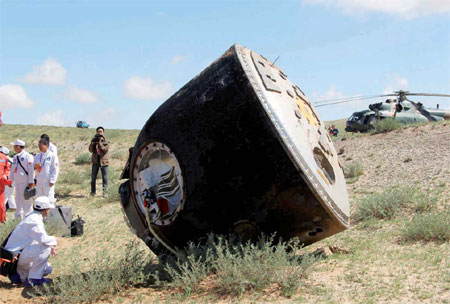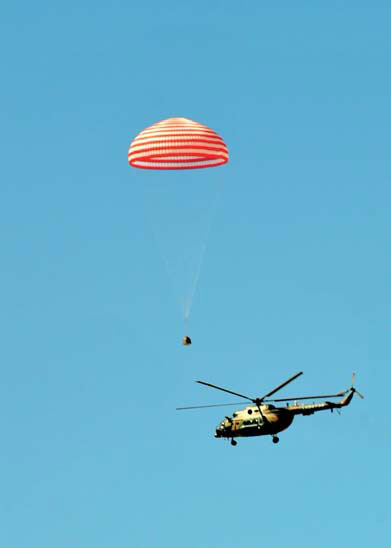Historic mission finished
Updated: 2012-06-29 11:31
By Xin Dingding in Beijing and Kelly Chung Dawson in New York (China Daily)
|
||||||||
|
The rescue team prepares to open a door to the Shenzhou IX capsule after it lands in Siziwang banner, Inner Mongolia autonomous region, on Friday. Wang Jianmin / Xinhua |
|
The Shenzhou IX capsule descends onto the grasslands of the Inner Mongolia autonomous region on Friday. Ren Junchuan / Xinhua |
Chinese astronauts bid farewell on Thursday to the Tiangong-1 space lab module after 10 days in orbit and returned home on Friday morning, wrapping up a historic mission for China's space program.
The Shenzhou IX re-entry capsule, carrying astronauts Jing Haipeng, Liu Wang and China's first female astronaut Liu Yang, completed a manual undocking from the Tiangong-1 on Thursday morning.
The capsule landed in the central part of the Inner Mongolia autonomous region a few minutes past 10 am.
Yang Zhijie, deputy director of the Inner Mongolia Weather Bureau, said it was the first time that a manned spacecraft landed in the region during the summer. Three earlier manned space missions all returned in the fall.
"The landing area has unpredictable weather in June and thunderstorms, gales and hailstones are not uncommon," said Yang, who added that conditions at the landing site on Friday were ideal.
Lifted by a white and blue parachute of 1,200 square meters - the size of three basketball courts - the capsule landed on the Inner Mongolia grasslands.
Within a few minutes, helicopters arrived near the capsule. A total of seven helicopters were used to search for the capsule, including three that offer emergency medical treatment.
The launch took place on June 16 and successful dockings, both automatic and manual, were achieved.
"The docking is a technological milestone, and represents a significant advance in capability," said David Mindell, a professor of aeronautics and astronautics at the Massachusetts Institute of Technology in the United States. "It is a difficult task, and also a huge stepping stone toward future advances."
Eileen Collins, a retired NASA astronaut, said that she hoped the crew had enjoyed their time in space. "It's a very wonderful, human experience," she said. "And as a former pilot, I feel a kinship with Liu Yang. I hope that some day we might meet."
Pamela Melory, also a retired NASA astronaut, acknowledged the significance of the docking.
"It is an impressive achievement, and a very difficult thing to do," she said. "From those of us who are passionate about space, we wish them congratulations on their accomplishment. However, I will say that it's not over until it's over. We'll be watching carefully, and hoping for their safety and success in returning to Earth."
Since starting its manned space mission in 1992, China has spent nearly 39 billion yuan ($6.13 billion) on the program, according to spokeswoman Wu.
Previously the government announced ambitious plans for space travel, including building more powerful carrier rockets and space freighters, and the eventual construction of a space station.
The US and the former Soviet Union led the world in pioneering space travel. The US carried out a space docking in 1966. China is now the third country to successfully demonstrate its technical capability and knowledge for human space travel.
The slow and methodical pace at which China has developed its program is commendable, said John Logsdon, the former director of space policy at George Washington University, and current member of the NASA Advisory Council.
"China has gone about it step by step, with each mission demonstrating new capabilities," he said. "That's a path to long-term, stable and sustainable development. That's probably smarter than what we did, when we rushed to the moon just to get there."
The US still spends $17.7 billion annually on space, Logsdon said.
"We are in a period of transition after the space shuttle," he said. "We are working on developing the capability for human flight beyond Earth orbit, with rockets for deep space. We are in a pause."
The US has also shifted focus to commercial space flight, Collins said. SpaceX, a private company, made history earlier this month when it conducted the first commercial round-trip flight to the international space station.
"It might appear that the US is scaling back because the shuttles are not flying, but the US is working with private companies to develop smaller rockets for space travel," Collins said.
The move toward commercialization is natural, she said.
"This is a normal part of the development of a transportation system," she said.
"In the past, the US initiated the launch of railroads and aircraft, for example, and then over time the private sector took over. Eventually in the US the private sector will own the rockets, operate the missions and NASA will simply purchase seats for missions."
It is unclear whether China will ultimately commercialize its own space industry, Mindell said.
"One of the strengths of the American model is that NASA's spacecraft have always been made by private companies at the direction of NASA. That model has allowed for competition between different players," Mindell said.
"China is where the US has been for over 40 years, and it still has to successfully demonstrate further achievements," Melroy said. "But I imagine they will; it just might take some time."
Contact the writers at kdawson@chinadailyusa.com and xindingding@chinadaily.com.cn

 Relief reaches isolated village
Relief reaches isolated village
 Rainfall poses new threats to quake-hit region
Rainfall poses new threats to quake-hit region
 Funerals begin for Boston bombing victims
Funerals begin for Boston bombing victims
 Quake takeaway from China's Air Force
Quake takeaway from China's Air Force
 Obama celebrates young inventors at science fair
Obama celebrates young inventors at science fair
 Earth Day marked around the world
Earth Day marked around the world
 Volunteer team helping students find sense of normalcy
Volunteer team helping students find sense of normalcy
 Ethnic groups quick to join rescue efforts
Ethnic groups quick to join rescue efforts
Most Viewed
Editor's Picks

|

|

|

|

|

|
Today's Top News
Health new priority for quake zone
Xi meets US top military officer
Japan's boats driven out of Diaoyu
China mulls online shopping legislation
Bird flu death toll rises to 22
Putin appoints new ambassador to China
Japanese ships blocked from Diaoyu Islands
Inspired by Guan, more Chinese pick up golf
US Weekly

|

|








